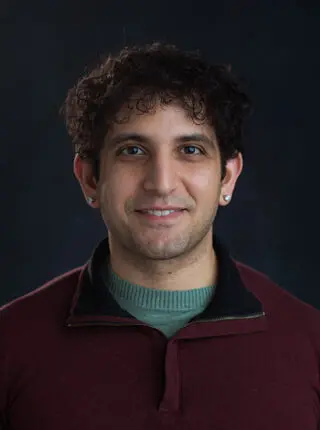Team
Greenberg Lab Members
Principal Investigator
Roger Greenberg, MD, PhD

J. Samuel Staub, M.D. Professor of Cancer Biology
rogergr@pennmedicine.upenn.edu
215-746-2738
Roger Greenberg, MD, PhD, is the J. Samuel Staub, M.D. Professor in the Department of Cancer Biology at the University of Pennsylvania Perelman School of Medicine, where he also serves as Director of the Penn Center for Genome Integrity and the Director of Basic Science for the Basser Center for BRCA. During Dr. Greenberg’s early training, he demonstrated the first evidence that telomere shortening suppresses carcinogenesis in vivo, and subsequently, he helped define a BRCA1-centered tumor suppressor network. Dr. Greenberg’s independent laboratory investigates basic mechanisms of genome integrity maintenance and their impact on cancer etiology and response to therapy. His group discovered that ubiquitin chains serve as a platform for BRCA1 DNA damage recognition, identified biallelic mutations in BRCA1 as a cause of Fanconi Anemia, and developed novel systems to identify ATM kinase dependent transcriptional silencing near DNA double-strand breaks. More recently, his group defined the molecular underpinnings of homologous recombination dependent telomere lengthening mechanisms that occur in nearly 15% of cancers, and mechanisms that enable DNA damage responses to communicate with the immune system.
Dr. Greenberg is a recipient of numerous awards, including the Michael Brown New Investigator Award for Basic Science, Kimmel Scholar Award in Translational Science, Charles E. Culpeper Scholarship in Medical Sciences, a Harrington Discovery Institute Scholar-Innovator Award, and the Stanley N. Cohen Award for Biomedical Research. He has also been elected to the American Society of Clinical Investigation and American Association of Physicians. Dr. Greenberg previously chaired the DNA Mechanisms of Cancer study section for the American Cancer Society and is now a member of the NIH Cancer Etiology Study Section.
Education:
BA - Haverford College
MD and PhD - The Albert Einstein College of Medicine
Residency – Brigham and Women’s Hospital
Post-doctoral Fellowship - Dana-Farber Cancer Institute
Administration
Laura Murillo

Administrative Director
murillo@upenn.edu
215-573-0908
Laura Murillo graduated from Emerson College in Boston, MA in 2005 with a Bachelor of Fine Arts. She then spent a year in New York City working as an Editorial Assistant on the website EuroCheapo.com. Laura provided administrative support to Drs. Eric J. Brown, Roger A. Greenberg, and Ben Z. Stanger and their labs from 2007-2019, during which time she also coordinated two seminar series, managed three websites, and several symposia for the Penn Pancreatic Cancer Research Center (PCRC) and the Abramson Family Cancer Research Institute (AFCRI). She is now the Administrative Director for the Penn Center for Genome Integrity (PCGI) supporting Center operations, seminars, and the Greenberg Lab.
Lab Management
Weihua Li

Research Specialist, Lab Manager
weihua@pennmedicine.upenn.edu
Weihua Li is a Research Specialist and the Lab Manager for the Greenberg Laboratory. Weihua has been working on mechanisms of DNA repair of double strand breaks (DSB) and response to targeted therapies since 2016. Before she joined the lab, Weihua had worked as a research specialist at Penn and Monell Chemical Senses Center, investigating Stem cell / iPS transcription factors in endothelium, orofacial bone mesenchymal stem cells, and taste receptor genes. Weihua has 10 published papers (see bibliography) and has been awarded 2 patents.
Lab Members
Jie Chen, PhD

Michael Brown Penn-GSK Postdoctoral Fellow
chenjie4@pennmedicine.upenn.edu
Dr. Chen was born and raised in Suizhou, China. He completed his PhD from the University of Hong Kong, Hong Kong SAR, China. His scientific interest focuses on the communication between DNA damage and anti-tumor immune responses (Chen J, et. al., Cell Reports 2020). Outside of the lab, Dr. Chen enjoys playing basketball and Judo.
Arindam Datta, PhD

Postdoctoral Researcher
Arindam.Datta@Pennmedicine.upenn.edu
Arindam carried out his doctoral research at CSIR-Indian Institute of Chemical Biology, Kolkata, India, under the mentorship of Dr. Susanta Roychoudhury, and received his PhD in Biotechnology from the University of Calcutta. His PhD research work focused on understanding the molecular mechanism of gain-of-function (GOF) mutant p53-driven tumorigenesis and resulted in four first-author publications (Datta A et al., EMBO reports, 2017; Datta A et al., Genes, 2019; Datta A et al., Genome Data, 2016; Ghatak D and Datta A et al., Molecular Cancer Research, 2021). After receiving his PhD, Arindam joined the lab of Robert Brosh in the Helicases and Genome Integrity Section at the National Institute on Aging (NIH) as a Visiting Scientist Postdoctoral Fellow. He investigated the molecular functions of RECQ helicases implicated in genome stability maintenance and characterized a specialized role of WRN helicase in recovery of stalled replication forks under the condition of BRCA2 genetic deficiency (Datta A et al., Nature Communication, 2021, In press).
Arindam joined the lab in November 2021 and is currently studying the roles of BRCA1-A complex in regulation of double-strand break repair in human cells. Outside of the lab, he enjoys hiking, reading books, cooking, and music.
Haoyang Jiang, PhD

Postdoctoral Researcher
Haoyang.Jiang@pennmedicine.upenn.edu
Haoyang was born and raised in Changzhou, China. He obtained his B. Sc. in Biological Sciences at Nanjing University, followed by a Ph.D. in Molecular, Cellular, and Integrative Biological Sciences at Penn State under the supervision of Dr. Joseph Reese. There he revealed that the Ccr4-Not complex is involved in DNA damage-induced RNAPII destruction in yeast.
In the Greenberg lab, Haoyang applies his biochemical skills to human cells and cancer therapy. He is looking into new therapeutic targets for treating breast/ovarian cancer and ALT (alternative lengthening of telomere) positive cancers and understanding their driving mechanisms. He recently published a paper with Dr. Greenberg exploring pathway-selective agents that target DNA repair deficiencies in a tumor tissue agnostic manner (Jiang H, Greenberg RA, Clin Cancer Res. 2021).
Outside of the lab, he likes music and is a big fan of history.
Reona Kato, PhD

Postdoctoral Researcher
Reona.Kato@Pennmedicine.upenn.edu
Dr. Reona Kato was born in Japan, and received his B.Sc. in Biological Science at Shizuoka University. He went on to obtain his PhD in Molecular Radiology from the Center for Disease Biology and Integrative Medicine at The University of Tokyo, under the supervision of Dr. Kiyoshi Miyagawa.
Fascinated in homologous recombination and end-joining repair of DSBs at transcriptionally active chromatin regions, Dr. Kato joined the Greenberg lab in 2022 as postdoctoral Researcher to pursue work in DNA damage and immune responses.
Sangin Kim, PhD

Postdoctoral Researcher
Sangin.Kim@Pennmedicine.upenn.edu
Sangin was born and raised in South Korea. He obtained his B.S. and Ph.D. in Biological Sciences from Ulsan National Institute of Science and Technology (UNIST) and Center for Genomic Integrity of Institute for Basic Science (IBS-CGI), co-supervised by Drs. Kyungjae (KJ) Myung and Kyoo-young Lee. During his PhD studies, he focused on PCNA cycling and ubiquitination, providing insights into R-loop dynamics at the transcription-replication conflict sites. In addition, his work contributed to the understanding the effects of Polyubiquitinated PCNA during break-induced replication (BIR) in alternative lengthening of telomeres (ALT). His work resulted in three-first author publications (Kim et al., Nucleic Acids Research, 2020; Kim et al., BioRxiv, 2023; Kim et al., PLOS One, 2023). He joined the Greenberg lab as a Postdoctoral Researcher in March, to investigate the underlying mechanism of ATM-mediated DSB silencing. He quickly distinguished himself by receiving the competitive Damon Runyon Postdoctoral Fellowship award in November 2024. Outside of the lab, Sangin enjoys movies, music, and traveling.
Stefano Misino, PhD
Postdoctoral Researcher
Stefano.Misino@pennmedicine.upenn.edu
Stefano was born and raised in Italy, where he obtained his B.Sc. at the University of Pavia. After attending an Erasmus program, Stefano decided to move to Sweden where he achieved his M.Sc. at Lund University. He then moved to Mainz, Germany, where he conducted his PhD under the supervision of Brian Luke at the Institute of Molecular Biology (IMB). Here, Stefano addressed the regulation and function of TERRA in yeast cells that adopt the alternative lengthening mechanism of telomeres (ALT) to maintain their chromosome ends.
In the Greenberg lab, Stefano aims at deciphering at a molecular level the recombinational events characterizing ALT, with a specific emphasis on the spatial organization of telomeres. Furthermore, he is in pursuit of the origin of ALT in senescent cells before immortalization. Passionate about telomeres biology, Stefano strongly hopes his work will contribute to a better understanding of how specific cancers engage ALT with the prospect to develop better therapeutic strategies.
Taku Harada

Graduate Student
Taku.Harada@Pennmedicine.upenn.edu
Taku received his BS and MS in biochemistry from Brandeis University in 2018. Under the mentorship of Dr. Susan Lovett, he studied the structure-function relationship of a DNA polymerase subunit in E. coli. He then joined Dr. Stuart Orkin’s group in the Hematology/Oncology Department at the Boston Children’s Hospital as a Research Technologist, where he identified mechanisms of transcriptional dependencies in acute myeloid leukemia. Joining the Greenberg lab in 2023 as a PhD student, Taku is working to determine how genomic instability activates inflammasomes and the subsequent inflammatory cell state. Outside the lab, Taku is a member of the Penn Club Swimming Team and enjoys cooking, often sharing with his classmates.
Tao Shi, PhD

Postdoctoral Researcher
Tao.Shi@Pennmedicine.upenn.edu
Tao Shi was born and raised in China. From 2009 to 2016, she performed her Bachelor's and Master's studies at Northwest A&F University, China. From 2016 to 2021, she completed her PhD research at University Medical Center Utrecht, The Netherlands, where she was studying how the tumor suppressor p53 was regulated by differential cellular signaling, such as DNA damage and redox signaling (Shi and Dansen, 2020, Antioxidants & Redox signaling; Shi et al., 2021, Free radical biology & medicine; Shi et al., Antioxidants). She joined the Greenberg lab in 2022 as a Postdoctoral Researcher, where she is focusing on understanding how cells deal with DNA damage in mitosis. Out of the lab, Tao is a big fan of music and movies, and also keen on traveling and socializing.
Kumari Prerna, PhD

Postdoctoral Researcher
Kumari.Prerna@PennMedicine.upenn.edu
Prerna is native to India, where she completed her PhD at the Indian Institute of Technology (BHU), Varanasi, under the guidance of Prof. Vikash Kumar Dubey. Her doctoral research focused on investigating the proteins involved in the interplay between autophagy and apoptosis in breast cancer, leading to four publications (with one forthcoming) (Prerna K. et al. Int. J. Biol. Macromol. 2022; Prerna K. et al. J. Biomol. Struct. Dyn. 2021; Prerna K. et al. J. Biomol. Struct. Dyn. 2021). In September 2024, Prerna joined Dr. Greenberg’s lab, where she is exploring how DNA damage triggers innate immune responses. Outside of her scientific endeavors, she enjoys singing and listening to semi-classical and light music, reading, and engaging in social activities.
Adel Atari

Graduate Student
Adel.Atari@Pennmedicine.upenn.edu
Adel received his BS in chemical engineering from Northeastern University in 2019. During this time, he worked in Dr. Miles Miller's laboratory at the Massachusetts General Hospital studying in vivo pharmacokinetics of targeted anti-HER2 therapies (Li et. al, 2019, Cytometry Part A). After graduating, he joined the cancer program at the Broad Insitute as a Research Associate in Dr. Bill Sellers lab working within the Cancer Cell Line Factory (CCLF) project. In the Sellers lab/CCLF, he investigated methods for cancer patient cell model derivation, technologies for manipulating in vitro cell adhesion (McCue and Atari et. al, 2023, Small) and novel synthetic lethality in cancer cells with conditional signaling pathway activation (Chang et. al, 2023, Nature Genetics). Adel joined the Greenberg lab as a PhD student in 2024. He is working towards understanding the molecular events initiating Alternative Lengthening of Telomeres with an emphasis on the role of the chromatin remodeling protein ATRX and how its loss alters telomere biology.
Xiaodi Chen

Graduate Student
Xiaodi.Chen@Pennmedicine.upenn.edu
Xiaodi received her B.Sc. in Biochemistry from the University of Toronto in 2023. As an Undergraduate Research Assistant, she investigated novel therapeutics for brain tumors under the mentorship of Dr. Xi Huang at the Hospital for Sick Children. Joining the Greenberg lab as a PhD student in July 2024, Xiaodi is interested in studying genome integrity maintenance in the brain. Outside of the lab, Xiaodi enjoys hiking, pottery, and baking.
Sanim Rahman

Postdoctoral Researcher
Sanim was born and raised in Orlando, Florida. He obtained his BS in Chemical Engineering from the University of South Florida in 2019. Afterwards, he obtained his PhD in Molecular Biophysics at the Johns Hopkins School of Medicine working in Dr. Cynthia Wolberger’s lab. During this time, Sanim combined cryo-electron microscopy, biochemistry, and computational biophysics to elucidate the molecular mechanisms of histone methylation and deubiquitination.
Sanim joined the Greenberg Lab in June 2025 to investigate the molecular functions of BRCA1-BARD1. Outside of the lab, Sanim enjoys playing/watching basketball, traveling, music, and socializing.
Interested in joining the team? Please contact us at murillo@upenn.edu.

